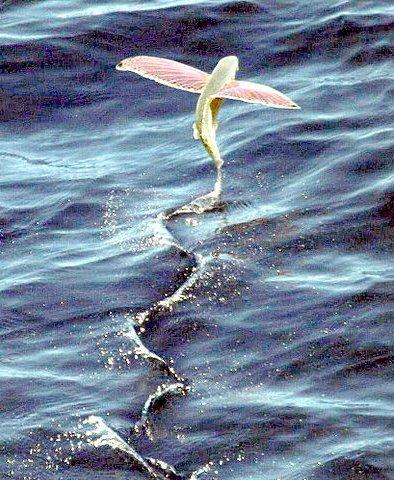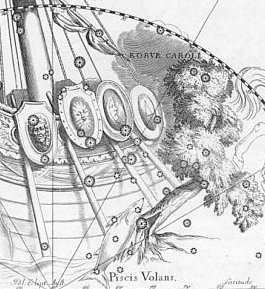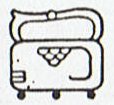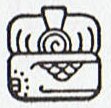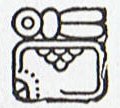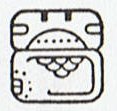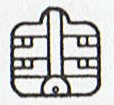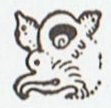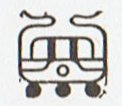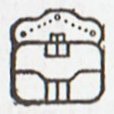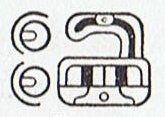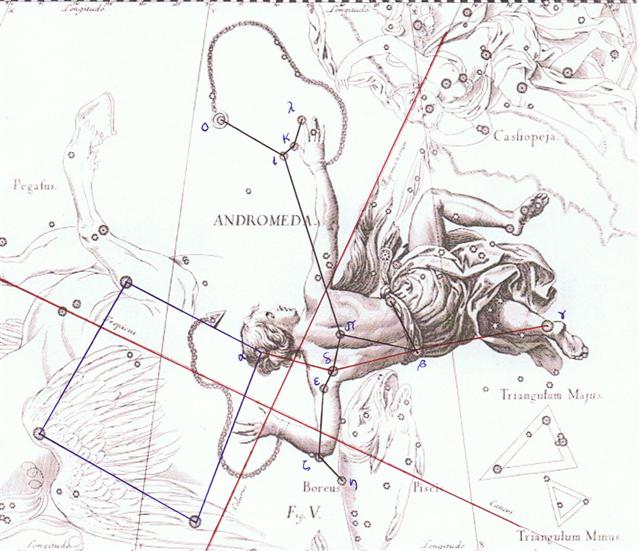66. There were 3 days from heliacal Sirius in JUNE 30 to the 'climbing bird' (manu kake) - who was a kind of 'fish' (Ga4-21).
... ka hati toou ngao e oto uta e te ariki e / mo tau papa rangaranga o haho i te tai / mo tuu huehue rangaranga o haho i te tai / mo tau hahave rere ai ka pae / mo tae ngu rere ai ka pae / mo te ika aringa riva nei he aku renga ai ka pae ... ... Broken is your neck, oh Oto Uta, oh king! / Floating (?) like a raft (?) out at sea. / To be erected for the drifting huehue (fish) out at sea. / Able (?) to put an end to the flight of the flying fish hahave; / Able (?) to put and end to the flight of the flying fish ngu; / Put an end to this fish, a dorado, with the good face! (E:87-90) ...
... God created Eve from one of Adam's ribs and therefore I have dared to translate the 'female' (β) star Al Sharas with The Rib. Although according to Allen this star was plural: ... β ... was one of Al Tizini's Al Sharāsīf, the Ribs, - i.e. of the Hydra, - and the first of the set ...
... Again they went on and reached Hanga Hoonu. They saw it, looked around, and gave the name 'Hanga Hoonu A Hau Maka'. On the same day, when they had reached the Bay of Turtles, they made camp and rested. They all saw the fish that were there, that were present in large numbers - Ah! Then they all went into the water, moved toward the shore, and threw the fish (with their hands) onto the dry land. There were great numbers (? ka-mea-ro) of fish. There were tutuhi, paparava, and tahe mata pukupuku. Those were the three kinds of fish.
After they had thrown the fish on the beach, Ira said, 'Make a fire and prepare the fish!' When he saw that there was no fire, Ira said, 'One of you go and bring the fire from Hanga Te Pau!' One of the young men went to the fire, took the fire and provisions (from the boat), turned around, and went back to Hanga Hoonu. When he arrived there, he sat down. They prepared the fish in the fire on the flat rocks, cooked them, and ate until they were completely satisfied. Then they gave the name 'The rock, where (the fish) were prepared in the fire with makoi (fruit of Thespesia populnea?) belongs to Ira' (Te Papa Tunu Makoi A Ira). They remained in Hanga Hoonu for five days ... These 5 'days' were probably nights (po). And counting from 22 / 7 ("July 22) the 5th night would have displayed "January 25 close to the Full Moon. 390 ("January 25) - 203 ("July 22) = 187 (= 183 + 4). The precessional depth down to Gregory XIII was 4 nights. The (Earth) Turtle - Pawahtun - came up on land after these 5 nights: ... They all sat down and rested [on the plain of Oromanga], when suddenly they saw that a turtle had reached the shore and had crawled up on the beach. He [Ira] looked at it and said, 'Hey, you! The turtle has come on land!' He said, 'Let's go! Let's go back to the shore.' They all went to pick up the turtle. Ira was the first one to try to lift the turtle - but she didn't move. Then Raparenga said, 'You do not have the necessary ability. Get out of my way so that I can have a try!' Raparenga stepped up and tried to lift the turtle - but Raparenga could not move her. Now you spoke, Kuukuu: 'You don't have the necessary ability, but I shall move this turtle. Get out of my way!' Kuukuu stepped up, picked up the turtle, using all his strength. After he had lifted the turtle a little bit, he pushed her up farther. No sooner had he pushed her up and lifted her completely off the ground when she struck Kuukuu with one fin. She struck downward and broke Kuukuu's spine.The turtle got up, went back into the (sea) water, and swam away. All the kinsmen spoke to you (i.e. Kuukuu): 'Even you did not prevail against the turtle!'
They put the injured Kuukuu on a stretcher and carried him inland. They prepared a soft bed for him in the cave and let him rest there. They stayed there, rested, and lamented the severely injured Kuukuu. Kuukuu said, 'Promise me, my friends, that you will not abandon me!' They all replied, 'We could never abandon you!' They stayed there twenty-seven days in Oromanga. Everytime Kuukuu asked, 'Where are you, friends?' they immediately replied in one voice, 'Here we are!' They all sat down and thought. They had an idea and Ira spoke, 'Hey, you! Bring the round stones (from the shore) and pile them into six heaps of stones!' One of the youths said to Ira, 'Why do we want heaps of stone?' Ira replied, 'So that we can all ask the stones to do something.' They took (the material) for the stone heaps (pipi horeko) and piled up six heaps of stone at the outer edge of the cave. Then they all said to the stone heaps, 'Whenever he calls, whenever he calls for us, let your voices rush (to him) instead of the six (of us) (i.e., the six stone heaps [Tau-ono] are supposed to be substitutes for the youths). They all drew back to profit (from the deception) (? ki honui) and listened. A short while later, Kuukuu called. As soon as he had asked, 'Where are you?' the voices of the stone heaps replied, 'Here we are!' All (the youths) said, 'Hey, you! That was well done!' ... They stayed there 27 days in Oromanga. The date when they left was Hora Iti 20: "He (i.e. Ira) said, 'Let's go! We shall go to Papa O Pea.' They got up and moved on. On the twentieth day of the month of August ('Hora Iti') they went to Papa O Pea."
When the 'fishes' (those below) were uprising the old king was in grave danger and the date when he had lain hidden in the Royal Oak coincided with the beginning of a new year (at the time of Hyadum II): ... Robur Carolinum, Charles' Oak, the Quercia of Italy and the Karlseiche of Germany, was formally published by Halley in 1679 in commemoration of the Royal Oak of his patron, Charles II, in which the king had lain hidden for twenty-four hours after his defeat by Cromwell in the battle of Worcester, on the 3rd of September 1651 ...
|
|||||||||||||||||||||||||||||||||||||||||||||||||||||||||||||||||||||||||||||||||||||||||||||||||||||||||||||||||||||||||||||||||||||||||||||||||||||||||||||||||||||||||||||||||||||||||||||||||||||||||||||||||||||||||||||||||||||||||||||||||||||||||||||||||||||||||||||||||||||||||||||||||||||||||||||||||||||||
